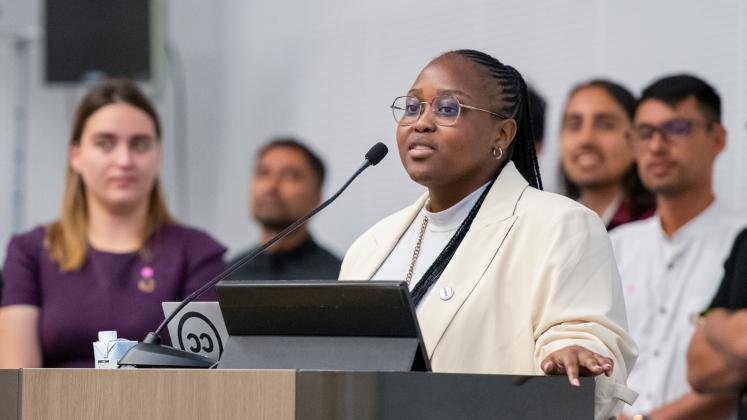This month, the United Nations Dag Hammarskjöld Library, in collaboration with the Department of Economic and Social Affairs, Division of Sustainable Development Goals, UNESCO’s Division of Science Policy and Capacity-Building, and the United Nations University hosted the Fourth United Nations Open Science and Open Scholarship Conference at UNU Headquarters in Tokyo. This is the first time this global event has been held outside of New York. This move is symbolic, highlighting a key message: the future of science cannot be limited to one region or language. It must be open, inclusive and accessible to all of humanity.
At last year’s Summit of the Future in New York, all 193 UN Member States adopted the Pact for the Future. This agreement reaffirmed a shared commitment to revitalizing multilateralism and accelerating sustainable development. Importantly, it recognized that science is not just a driver of innovation but also a fundamental pillar of peace, development and human rights.
The principle of open science embodies this truth. Knowledge is not a commodity to be hoarded, but a public good that gains power the more it is shared. The UNESCO Recommendation on Open Science advocates fair and widespread access to knowledge, ensuring that no one is left behind — irrespective of geography, gender, language or circumstance — in contributing to or benefiting from scientific progress.
The profit maximization barrier
Nevertheless, this vision of knowledge as a shared global good must contend with a strong opposing dynamic: the emphasis on profit maximization.
In our current system, scientific discoveries are often viewed as private assets. Major academic publishers lock vital research behind expensive paywalls, making it inaccessible to researchers, students and policymakers, especially in lower-income countries. This issue is worsened by the commercialization of science, which encourages secrecy through patents and proprietary data, creating a competitive environment in which knowledge is withheld for market advantage.
This economic model directly weakens the collaborative spirit of open science, transforming it from a tool for universal progress into a commodity that intensifies existing inequalities.
Knowledge is not a commodity to be hoarded, but a public good that gains power the more it is shared.
The gap between aspiration and reality remains wide. Billions of people still lack meaningful access to scientific resources, infrastructure and technologies.
In my own field of artificial intelligence (AI), this divide is especially pronounced. Wealthier nations and corporations have access to high-performance computing, extensive data resources and top talent, while much of the developing world remains excluded, further deepening global inequality.
Open science: a catalyst for Africa’s development
For Africa, this is not just an academic debate; it is a critical issue for the continent’s development. Open science can first accelerate innovation and address local challenges. By providing African researchers, entrepreneurs, and policymakers with access to the latest scientific knowledge, open science can fast-track solutions to urgent local issues, including food security, climate change, and public health.
Open science can increase visibility and foster collaboration. Open access platforms and collaborative research initiatives improve the visibility of African research on the global stage.
This not only gives African scientists the recognition they deserve but also promotes vital North-South and South-South partnerships.
Open science is not only a scientific requirement but also a moral duty to create a fairer world.
Furthermore, open science can empower the next generation. When educational resources and scientific data are freely available, it empowers a new generation of African scientists, innovators and leaders, democratizing knowledge and building a strong, self-sustaining scientific community.
Open science promotes transparency and good governance. Open access to data and research enhances evidence-based policymaking, boosting transparency and accountability in governance.
This is more than just access; it is a matter of justice. Essential solutions to global challenges through science and technology require inclusivity, not exclusivity. Open science is therefore not only a scientific requirement but also a moral duty to create a fairer world.
It is therefore crucial that we close the global digital divide, build public trust in science, create open infrastructure, and ensure AI benefits all of humanity. The focus should be on turning high-level ideas into practical, actionable open science solutions.
Hosting the United Nations Open Science and Open Scholarship Conference is especially significant. By uniting scientists, policymakers and civil society from around the world, it reaffirms the importance of creating spaces for global dialogue and problem-solving.
By making knowledge more transparent, accessible and inclusive, we unlock one of humanity’s most potent tools: our collective intelligence and creativity.
In this way, we link research and policy, close the gaps between the Global North and South, and ensure that the benefits of scientific progress are shared broadly and fairly.
Open science alone will not solve all of humanity’s challenges. However, without it, our solutions will remain incomplete and uneven. By making knowledge more transparent, accessible and inclusive, we unlock one of humanity’s most potent tools: our collective intelligence and creativity.
The world faces urgent tests, ranging from climate breakdown to growing inequality. In such times, hoarding knowledge is not only unwise but also unjust. Open science means more than transparency; it embodies fairness, collaboration and the belief that progress belongs to everyone.
When science is open and inclusive, it can lay the groundwork for a more sustainable, peaceful and just world. That is the vision we should all be committed to advancing.
Suggested citation: Tshilidzi Marwala. "Unlocking Knowledge — Why Africa’s Future Depends on Open Science," United Nations University, UNU Centre, 2025-10-28, https://unu.edu/article/unlocking-knowledge-why-africas-future-depends-open-science.



